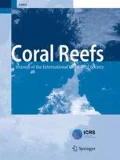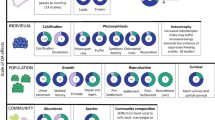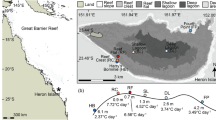Abstract
Ocean acidification and ocean warming constitute major threats to many calcifying reef organisms, including scleractinian corals. The combined effects of these two environmental stressors on the earliest life history stages of reef calcifiers remain poorly studied, particularly for Atlantic corals. Here, we investigate how acidification and warming influence the fertilization success, larval survivorship, and larval settlement of the threatened Atlantic coral, Orbicella faveolata. Gametes and larvae from O. faveolata were subjected to a factorial combination of warming (ambient versus + 1.5 °C) and acidification (ambient versus − 0.2 pH units) projected to occur by the year 2050. O. faveolata individuals were maintained in the same treatments throughout all early life history stages investigated. The fertilization success of O. faveolata was not affected by acidification, warming, or their combination. However, during larval development, warming caused complete mortality and prevented any subsequent settlement. Interestingly, these negative effects of warming were mitigated when combined with ocean acidification, such that both larval survivorship and settlement increased by 41% in the combined treatment relative to the isolated warming treatment. Our research suggests that temperature-induced increases in larval metabolism may be counterbalanced by acidification, which serves to reduce larval metabolism. Notwithstanding, larval survivorship and settlement were still reduced by 50% under combined acidification and warming relative to the ambient treatment, indicating that climate change will continue to serve as major stressor during the early life history stages of corals, jeopardizing the resilience of Caribbean reefs.





Similar content being viewed by others
References
Albright R, Langdon C (2011) Ocean acidification impacts multiple early life history processes of the Caribbean coral Porites astreoides. Global Change Biology 17:2478–2487
Albright R, Mason B (2013) Projected near-future levels of temperature and pCO2 reduce coral fertilization success. PLoS One 8:e56468
Albright R, Mason B, Miller M, Langdon C (2010) Ocean acidification compromises recruitment success of the threatened Caribbean coral Acropora palmata. Proceedings of the National Academy of Sciences of the United States of America 107:20400–20404. https://doi.org/10.1073/pnas.1007273107
Ayre DJ, Hughes TP (2000) Genotypic diversity and gene flow in brooding and spawning corals along the Great Barrier Reef, Australia. Evolution 54:1590–1605
Baria MVB, Kurihara H, Harii S (2015) Tolerance to elevated temperature and ocean acidification of the larvae of the solitary corals Fungia fungites (Linnaues, 1758) and Lithophyllon repanda (Dana, 1846). Zool Sci 32:447–454. https://doi.org/10.2108/zs150036
Bassim K, Sammarco P (2003) Effects of temperature and ammonium on larval development and survivorship in a scleractinian coral (Diploria strigosa). Marine Biology 142:241–252
Bassim K, Sammarco P, Snell T (2002) Effects of temperature on success of (self and non-self) fertilization and embryogenesis in Diploria strigosa (Cnidaria, Scleractinia). Marine Biology 140:479–488. https://doi.org/10.1007/s00227-001-0722-4
Baums I, Devlin-Durante M, Polato N, Xu D, Giri S, Altman N, Ruiz D, Parkinson J, Boulay J (2013) Genotypic variation influences reproductive success and thermal stress tolerance in the reef building coral, Acropora palmata. Coral Reefs 32:703–717
Bishop CD, Huggett MJ, Heyland A, Hodin J, Brandhorst BP (2006) Interspecific variation in metamorphic competence in marine invertebrates: the significance for comparative investigations into the timing of metamorphosis. Integrative and comparative biology 46:662–682
Brown B (1997) Coral bleaching: causes and consequences. Coral Reefs 16:S129–S138
Brown JH, Gillooly JF, Allen AP, Savage VM, West GB (2004) Toward a metabolic theory of ecology. Ecology 85:1771–1789. https://doi.org/10.1890/03-9000
Byrne M, Przeslawski R (2013) Multistressor impacts of warming and acidification of the ocean on marine invertebrates’ life histories. Integrative and comparative biology 53:582–596
Carpenter KE, Abrar M, Aeby G, Aronson RB, Banks S, Bruckner A, Chiriboga A, Cortes J, Delbeek JC, DeVantier L, Edgar GJ, Edwards AJ, Fenner D, Guzman HM, Hoeksema BW, Hodgson G, Johan O, Licuanan WY, Livingstone SR, Lovell ER, Moore JA, Obura DO, Ochavillo D, Polidoro BA, Precht WF, Quibilan MC, Reboton C, Richards ZT, Rogers AD, Sanciangco J, Sheppard A, Sheppard C, Smith J, Stuart S, Turak E, Veron JEN, Wallace C, Weil E, Wood E (2008) One-third of reef-building corals face elevated extinction risk from climate change and local impacts. Science 321:560–563
Carpenter RC, Edmunds PJ (2006) Local and regional scale recovery of Diadema promotes recruitment of scleractinian corals. Ecology Letters 9(3):271–280
Chan WY, Peplow LM, Menéndez P, Hoffmann AA, van Oppen MJ (2018) Interspecific hybridization may provide novel opportunities for coral reef restoration. Frontiers in Marine Science 5:160
Chan WY, Peplow LM, van Oppen MJ (2019) Interspecific gamete compatibility and hybrid larval fitness in reef-building corals: implications for coral reef restoration. Scientific reports 9:4757
Chave KE, Suess E (1970) Calcium carbonate saturation in seawater: effects of dissolved organic matter. Limnology and Oceanography 15:633–637
Chua CM, Leggat W, Moya A, Baird AH (2013a) Near-future reductions in pH will have no consistent ecological effects on the early life-history stages of reef corals. Marine Ecology Progress Series 486:143–151. https://doi.org/10.3354/meps10318
Chua CM, Leggat W, Moya A, Baird AH (2013b) Temperature affects the early life history stages of corals more than near future ocean acidification. Marine Ecology Progress Series 475:85–92. https://doi.org/10.3354/meps10077
Coles S, Jokiel P (1977) Effects of temperature on photosynthesis and respiration in hermatypic corals. Marine biology 43:209–216
Cumbo V, Fan T, Edmunds P (2013) Effects of exposure duration on the response of Pocillopora damicornis larvae to elevated temperature and high pCO2. Journal of Experimental Marine Biology and Ecology 439:100–107
Deutsch C, Ferrel A, Seibel B, Pörtner H-O, Huey RB (2015) Climate change tightens a metabolic constraint on marine habitats. Science 348:1132–1135
Dickson A, Millero F (1987) A comparison of the equilibrium constants for the dissociation of carbonic acid in seawater media. Deep Sea Research Part A Oceanographic Research Papers 34:1733–1743
Doney SC, Ruckelshaus M, Duffy JE, Barry JP, Chan F, English CA, Galindo HM, Grebmeier JM, Hollowed AB, Knowlton N, Polovina J, Rabalais NN, Sydeman WJ, Talley LD (2012) Climate change impacts on marine ecosystems. Annu Rev Mar Sci 4:11–37. https://doi.org/10.1146/annurev-marine-041911-111611
Doropoulos C, Diaz-Pulido G (2013) High CO2 reduces the settlement of a spawning coral on three common species of crustose coralline algae. Marine Ecology Progress Series 475:93–99. https://doi.org/10.3354/meps10096
Doropoulos C, Ward S, Diaz-Pulido G, Hoegh-Guldberg O, Mumby PJ (2012) Ocean acidification reduces coral recruitment by disrupting intimate larval-algal settlement interactions. Ecol Lett 15:338–346. https://doi.org/10.1111/j.1461-0248.2012.01743.x
Edmunds P, Gates R, Gleason D (2001) The biology of larvae from the reef coral Porites astreoides, and their response to temperature disturbances. Marine Biology 139:981–989
Ellis J, Solander DC (1786) The natural history of many curious and uncommon zoophytes: collected from various parts of the globe by the late John Ellis. Benjamin White and Son
Fabry VJ, Seibel BA, Feely RA, Orr JC (2008) Impacts of ocean acidification on marine fauna and ecosystem processes. ICES Journal of Marine Science 65:414–432
Field CB, Barros VR, Mastrandrea MD, Mach KJ, Abdrabo M-K, Adger N, Anokhin YA, Anisimov OA, Arent DJ, Barnett J (2014) IPCC Summary for policymakers Climate change 2014: impacts, adaptation, and vulnerability Part A: global and sectoral aspects Contribution of Working Group II to the Fifth Assessment Report of the Intergovernmental Panel on Climate Change. Cambridge University Press, pp 1–32
Figueiredo J, Baird AH, Harii S, Connolly SR (2014) Increased local retention of reef coral larvae as a result of ocean warming. Nat Clim Chang 4:498–502. https://doi.org/10.1038/nclimate2210
Foster T, Gilmour J, Chua C, Falter J, McCulloch M (2015) Effect of ocean warming and acidification on the early life stages of subtropical Acropora spicifera. Coral Reefs 34:1217–1226
Gates RD, Edmunds PJ (1999) The physiological mechanisms of acclimatization in tropical reef corals. American Zoologist 39:30–43
Gattuso JP, Magnan A, Billé R, Cheung W, Howes E, Joos F, Allemand D, Bopp L, Cooley S, Eakin C (2015) Contrasting futures for ocean and society from different anthropogenic CO2 emissions scenarios. Science 349: aac4722
Gibson R, Atkinson R, Gordon J, Smith I, Hughes D (2011) Impact of ocean warming and ocean acidification on marine invertebrate life history stages: vulnerabilities and potential for persistence in a changing ocean. Oceanogr Mar Biol Annu Rev 49:1–42
Grajales A, Sánchez JA (2016) Holobiont assemblages of dominant coral species (Symbiodinium types and coral species) shape Caribbean reef community structure. Físicas y Naturales 40(155):300–311
Hoegh-Guldberg O (1999) Climate change, coral bleaching and the future of the world’s coral reefs. Marine and freshwater research 50:839–866
Hoegh-Guldberg O, Mumby PJ, Hooten AJ, Steneck RS, Greenfield P, Gomez E, Harvell CD, Sale PF, Edwards AJ, Caldeira K (2007) Coral reefs under rapid climate change and ocean acidification. Science 318: 1737–1742
Hoegh-Guldberg O, Poloczanska ES, Skirving W, Dove S (2017) Coral reef ecosystems under climate change and ocean acidification. Frontiers in Marine Science 4:158
Hughes TP, Tanner JE (2000) Recruitment failure, life histories, and long-term decline of Caribbean corals. Ecology 81(8):2250–2263
Hughes TP, Baird AH, Bellwood DR, Card M, Connolly SR, Folke C, Grosberg R, Hoegh-Guldberg O, Jackson JB, Kleypas J (2003) Climate change, human impacts, and the resilience of coral reefs. Science 301: 929–933
Jackson JB (2008) Ecological extinction and evolution in the brave new ocean. Proceedings of the National Academy of Sciences 105:11458–11465
Koltes KH, Opishinski TB (2009) Patterns of water quality and movement in the vicinity of Carrie Bow Cay, Belize. Smithsonian Contributions to the Marine Sciences 38
Kornder NA, Riegl BM, Figueiredo J (2018) Thresholds and drivers of coral calcification responses to climate change. Global Change Biology 24(11): 5084–5095. https://doi.org/10.1111/gcb.14431
LaJeunesse TC, Parkinson JE, Gabrielson PW, Jeong HJ, Reimer JD, Voolstra CR, Santos SR (2018) Systematic Revision of Symbiodiniaceae Highlights the Antiquity and Diversity of Coral Endosymbionts. Curr Biol 28: 2570- + https://doi.org/10.1016/j.cub.2018.07.008
Langenbuch M, Bock C, Leibfritz D, Pörtner H-O (2006) Effects of environmental hypercapnia on animal physiology: a 13C NMR study of protein synthesis rates in the marine invertebrate Sipunculus nudus. Comparative Biochemistry and Physiology Part A: Molecular & Integrative Physiology 144:479–484
Levitan DR, Fogarty ND, Jara J, Lotterhos KE, Knowlton N (2011) Genetic, spatial, and temporal components of precise spawning synchrony in reef building corals of the Montastraea annularis species complex. Evolution 65:1254–1270
Levitan DR, Fukami H, Jara J, Kline D, McGovern TM, McGhee KE, Swanson CA, Knowlton N (2004) Mechanisms of reproductive isolation among sympatric broadcast-spawning corals of the Montastraea annularis species complex. Evolution 58:308–323
Levitan DR, McGovern TM (2005) The Allee effect in the sea. Marine conservation biology: the science of maintaining the sea’s biodiversity Island Press, Washington DC: 47–57
McClanahan T, Weil E, Cortés J, Baird A, Ateweberhan M (2009) Consequences of coral bleaching for sessile reef organisms. Coral bleaching. Springer, pp 121–138
McCulloch M, Falter J, Trotter J, Montagna P (2012) Coral resilience to ocean acidification and global warming through pH up-regulation. Nat Clim Chang 2:623–633. https://doi.org/10.1038/nclimate1473
Mehrbach C, Culberson C, Hawley J, Pytkowicx R (1973) Measurement of the apparent dissociation constants of carbonic acid in seawater at atmospheric pressure1. Limnology and Oceanography 18:897–907
Morita M, Suwa R, Iguchi A, Nakamura M, Shimada K, Sakai K, Suzuki A (2010) Ocean acidification reduces sperm flagellar motility in broadcast spawning reef invertebrates. Zygote 18:103–107. https://doi.org/10.1017/s0967199409990177
Morse DE, Hooker N, Morse AN, Jensen RA (1988) Control of larval metamorphosis and recruitment in sympatric agariciid corals. Journal of Experimental Marine Biology and Ecology 116:193–217
Nakamura M, Ohki S, Suzuki A, Sakai K (2011) Coral larvae under ocean acidification: survival, metabolism, and metamorphosis. PLoS One 6:e14521
Negri A, Marshall P, Heyward A (2007) Differing effects of thermal stress on coral fertilization and early embryogenesis in four Indo Pacific species. Coral Reefs 26:759–763
NMFS (2014) Final listing determinations on proposal to list 66 reef-building coral species and to reclassify elkhorn and staghorn corals, final rule 79, Federal Register 53852–54123
Nozawa Y, Harrison P (2002) Larval settlement patterns, dispersal potential, and the effect of temperature on settlement of larvae of the reef coral, Platygyra daedalea, from the Great Barrier Reef Proc 9th Int Coral Reef Symp, pp 409–416
Nozawa Y, Harrison PL (2007) Effects of elevated temperature on larval settlement and post-settlement survival in scleractinian corals, Acropora solitaryensis and Favites chinensis. Marine Biology 152:1181–1185
O’Donnell MJ, Todgham AE, Sewell MA, Hammond LM, Ruggiero K, Fangue NA, Zippay ML, Hofmann GE (2010) Ocean acidification alters skeletogenesis and gene expression in larval sea urchins. Marine Ecology Progress Series 398:157–171
Pandolfi JM, Bradbury RH, Sala E, Hughes TP, Bjorndal KA, Cooke RG, McArdle D, McClenachan L, Newman MJH, Paredes G, Warner RR, Jackson JBC (2003) Global trajectories of the long-term decline of coral reef ecosystems. Science 301:955–958. https://doi.org/10.1126/science.1085706
Pandolfi JM, Jackson JBC (2006) Ecological persistence interrupted in Caribbean coral reefs. Ecology Letters 9(7):818–826
Pörtner HO, Farrell AP (2008) Physiology and Climate Change. Science 322:690–692. https://doi.org/10.1126/science.1163156
Randall CJ, Szmant AM (2009a) Elevated temperature affects development, survivorship, and settlement of the elkhorn coral, Acropora palmata (Lamarck 1816). The Biological Bulletin 217:269–282
Randall CJ, Szmant AM (2009b) Elevated temperature reduces survivorship and settlement of the larvae of the Caribbean scleractinian coral, Favia fragum (Esper). Coral Reefs 28:537–545. https://doi.org/10.1007/s00338-009-0482-z
Raven J, Caldeira K, Elderfield H, Hoegh-Guldberg O, Liss P, Riebesell U, Shepherd J, Turley C, Watson A (2005) Ocean acidification due to increasing atmospheric carbon dioxide. The Royal Society policy document 12/05. The Clyvedon Press Ltd, Cardiff
Richmond RH (1997) Reproduction and recruitment in corals: critical links in the persistence of reefs. Life and death of coral reefs Chapman & Hall, New York, pp 175–197
Riebesell U, Fabry VJ, Hansson L, Gattuso J-P (2011) Guide to best practices for ocean acidification research and data reporting. Office for Official Publications of the European Communities, Luxembourg
Ritson-Williams R, Arnold SN, Fogarty ND, Steneck RS, Vermeij MJ, Paul VJ (2009) New perspectives on ecological mechanisms affecting coral recruitment on reefs. Smithsonian Contributions to the Marine Sciences: 437
Schnitzler C, Hollingsworth L, Krupp D, Weis V (2012) Elevated temperature impairs onset of symbiosis and reduces survivorship in larvae of the Hawaiian coral, Fungia scutaria. Marine Biology 159:633–642
Smith SV, Buddemeier R (1992) Global change and coral reef ecosystems. Annual Review of Ecology and Systematics 23:89–118
Sneed JM, Sharp KH, Ritchie KB, Paul VJ (2014) The chemical cue tetrabromopyrrole from a biofilm bacterium induces settlement of multiple Caribbean corals. Proceedings of the Royal Society of London B: Biological Sciences 281:20133086
Solomon S (2007) Climate change 2007-the physical science basis: Working group I contribution to the fourth assessment report of the IPCC. Cambridge University Press, Cambridge
Suwa R, Nakamura M, Morita M, Shimada K, Iguchi A, Sakai K, Suzuki A (2010) Effects of acidified seawater on early life stages of scleractinian corals (Genus Acropora). Fisheries Science 76:93–99
Szmant AM (1986) Reproductive ecology of Caribbean reef corals. Coral reefs 5:43–53
Tebben J, Motti C, Siboni N, Tapiolas D, Negri A, Schupp P, Kitamura M, Hatta M, Steinberg PD, Harder T (2015) Chemical mediation of coral larval settlement by crustose coralline algae. Scientific reports 5:10803
van Woesik R, Scott WJ IV, Aronson RB (2014) Lost opportunities: coral recruitment does not translate to reef recovery in the Florida Keys. Marine Pollution Bulletin 88(1–2):110–117
Watson S-A, Fabricius KE, Munday PL (2017) Quantifying pCO2 in biological ocean acidification experiments: a comparison of four methods. Plos One 12:e0185469
Wilkinson CC (2004) Status of coral reefs of the world: 2004. Australian Institute of Marine Science (AIMS)
Woolsey ES, Byrne M, Baird AH (2013) The effects of temperature on embryonic development and larval survival in two scleractinian corals. Marine Ecology Progress Series 493:179–184. https://doi.org/10.3354/meps10499
Acknowledgements
The work contributing to this paper has been supported by the US National Science Foundation Project OCE-1538469. This is a contribution #1015 of the Smithsonian Caribbean Coral Reef Ecosystems Program. We thank Zach Foltz, Valerie Paul, and Scott Jones at the Smithsonian Institution for their logistical support and Tom Opishinski for the ocean temperature data. We thank the Belizean Fisheries Department, marine scientific research permit number 000008-17, for allowing us to conduct this research. Finally, we appreciate the helpful comments by the three anonymous reviewers that greatly improved this manuscript. This is contribution #172 from the Center for Coastal Oceans in the Institute of Environment at Florida International University.
Author information
Authors and Affiliations
Corresponding author
Additional information
Publisher's Note
Springer Nature remains neutral with regard to jurisdictional claims in published maps and institutional affiliations.
Topic Editor Anastazia Banaszak
Electronic supplementary material
Below is the link to the electronic supplementary material.
338_2019_1888_MOESM1_ESM.tif
Supplemental Fig. 1 Monthly temperatures (mean ± SE) from the collection site near Carrie Bow Cay (16°48′06.0″N, 88°04′57.9″W) during 2017 (TIFF 24 kb)
338_2019_1888_MOESM2_ESM.tif
Supplemental Fig. 2 Daily temperatures of the survivorship and settlement mesocosms. Bars are color coded by treatment (AMB: ambient; OA: ocean acidification (pH -0.2 units); OW: ocean warming (+ 1.5 °C); OAW: ocean acidification and warming (pH -0.2 units, + 1.5 °C) (TIFF 90 kb)
Rights and permissions
About this article
Cite this article
Pitts, K.A., Campbell, J.E., Figueiredo, J. et al. Ocean acidification partially mitigates the negative effects of warming on the recruitment of the coral, Orbicella faveolata. Coral Reefs 39, 281–292 (2020). https://doi.org/10.1007/s00338-019-01888-4
Received:
Accepted:
Published:
Issue Date:
DOI: https://doi.org/10.1007/s00338-019-01888-4




